






As well as founding the Ealing Animal Charities Fair, Marion Garnett has also, since 2011, written a weekly Animal Rescue column which is published in the West London local newspaper, The Gazette. Columns published since January 2019 are now available online here.
If you would like to see any of the columns published before 2019, please contact Marion directly (see the Contacts page).
Column 2nd September 2019
Mayhew’s Open Day is a peep behind the scenes at what goes on at their busy animal rescue centre. As well as a fantastic street party with live music, veggie BBQ and games you can also tour the vet clinic and meet the cats waiting for a new home. During your tour of the vet clinic you will be able to try your hand at finding a foreign body and looking down a microscope.
Visiting Mayhew’s Open Day is a wonderful opportunity for anyone wanting to work
with animals to get a taste of what it might be like. Mayhew’s Open Day is on Sunday
September 8 (11am-
The AWOs have a unique role in animal welfare in London. As part of their work, they visit the homeless, rescue abandoned or mistreated animals and undertake educational programmes. They also play an important part in the welfare of feral cats.
According to Mayhew only 53% of Londoners understand what is meant by a feral cat. The term refers to cats which are not tame and have had little or no human contact.
Feral cats are the offspring of stray, feral or abandoned domestic cats. While
they were kittens, during their critical socialisation period (between two and eight
weeks old), feral cats missed out on having positive experiences with people such
as being lovingly held and handled, so they grow up fearful of people. Un-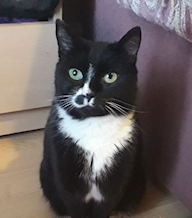 programme whereby they humanely trap feral cats, take them to Mayhew for neutering
and a health check and then, if appropriate, release them back to their previous
location. If you have a group of feral cats in your area, you can contact Mayhew’s
AWOs at
programme whereby they humanely trap feral cats, take them to Mayhew for neutering
and a health check and then, if appropriate, release them back to their previous
location. If you have a group of feral cats in your area, you can contact Mayhew’s
AWOs at
An important aspect of Mayhew’s work is rehoming animals and, after her owner died, Heidi came into Mayhew’s care. She is a nervous girl who takes time to form bonds. She’s gaining confidence in foster care and can be very affectionate. She is looking for a quiet adult home with an owner who understands shy cats. If this could be you, see themayhew.org or call 020 8962 8000.
Column 9th September 2019
The caller picked up their phone and dialled the RSPCA. They had just witnessed a man and woman tip a cat out of a carrier and run away. Terrified, the cat sat in the same spot for an hour without moving.
It’s not surprising that when I met him, he didn’t trust me. He sat in his cat bed
looking at me but didn’t want to get too close – except for titbits. But the RSPCA
staff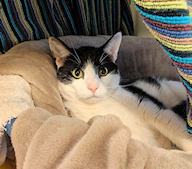 said that once Cloud does get to know and trust you, he’s a real sweetie. He’s
a stunning, solid boy who, given a chance, steals your heart. He’s also talkative.
The people who abandoned him should be grateful, he doesn’t speak English or else
he might say who it was treated him so badly.
said that once Cloud does get to know and trust you, he’s a real sweetie. He’s
a stunning, solid boy who, given a chance, steals your heart. He’s also talkative.
The people who abandoned him should be grateful, he doesn’t speak English or else
he might say who it was treated him so badly.
Cloud is looking for an adult home where he can, in his own time, learn to trust people again. If this could be with you, he’s waiting in his cat bed at the RSPCA Cat Adoption Centre, Burket Close, Southall.
The RSPCA say that cats are one of the most neglected animals. Last year, they received 134,537 calls about cats, that’s one call every four minutes. Greater London is a hotspot with 17,550 calls last year. Cats needed help for a variety of reasons – some needed rescuing because they’d got themselves into a tricky situation, some had unplanned pregnancies resulting in kittens which needed homing and some cats were being mistreated or abandoned. It’s always worth having the emergency number for the RSPCA in your phone (Tel: 0300 1234 999) as, like the caller who saw Cloud being dumped, you never know when you might need it.
This week, several animal welfare charities, including the RSPCA, have collaborated together to present a petition containing over 100,000 signatures to government calling for animals to be recognised as sentient beings in UK law. Animals have feelings and are capable of suffering and this needs to be recognised.
One way of achieving this is by education. Crucial to the improvement of animal welfare in the future is the way children think about animals. The RSPCA produces comprehensive educational materials teaching children to care for and respect animals. Through a set of innovative projects called Generation Kind, the RSPCA aims to inspire kindness to animals in the classroom. For example, they are organising a competition to see which is the RSPCA’s Most Compassionate Class 2020. For details see rspca.org.uk. Anyone tempted to mistreat animals needs to take a few lessons.
Column 16th September 2019
Wonderful news, this is the seventh and last instalment of the story of Kaleb at the Rehoming Centre. Just to recap on the story so far, after being rescued from a dog pound in Wales, Kaleb waited at the National Animal Welfare Trust (NAWT) rehoming centre for over three years for someone to visit the centre and decide he was the dog for them.
While he was waiting he has featured in this column on six previous occasions -
But Kaleb’s waiting is now over. In July, a couple walked into the rehoming centre
looking for a large dog – Kaleb immediately sat up and took notice as he’s a large
Lurcher. As soon as the couple saw him they knew he was, very likely, going to be
the one for them. They could see from the way he interacted with them, he was a
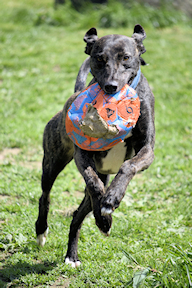 clever boy who could learn more.
clever boy who could learn more.
After several visits in which they got to know each other, Kaleb was taken to his wonderful new home two weeks ago and has settled beyond his owners’ expectations. He already knows several new commands. When his Dad comes in from being out all day, Kaleb is so pleased to see him, he brings him all his toys to share. He also loves the car and going places.
I met the new family on Saturday at NAWT’s Open Day. Kaleb was with his owners in the field where, for three years, he had been exercised daily. Kaleb had seen Open Days before but this one was different. At the end of the day, instead of going back to his kennel, Kaleb was taken to his car and driven back to his home. Although this column is the last episode of Kaleb at the Rehoming Centre, it’s great to know Kaleb’s at the start of an exciting new chapter in his life.
Kaleb has a wide variety of friends at the centre who also need a home. If you, too,
are interested in homing one, see details at nawt.org.uk and meet them at the rehoming
centre at Tylers Way, Watford by pass, WD25 8WT. It’s open daily from 11am-
Column 23rd September 2019
Crabs and lobsters aren’t the cuddliest of animals but they are still fascinating creatures. Did you know that lobsters can live over 100 years? Spiny lobsters are social animals who gather in groups of 12 or more and migrate in long chains across the ocean floor, up to 50 lobsters at a time. They communicate by flapping their pincers or drumming their claws. Hermit crabs live inside the discarded seashells of other species. David Attenborough tells how when hermit crabs meet, they trade shells. The crabs form an orderly chain from largest to smallest and then, when enough crabs of the right size are in place in the chain, they simultaneously change shells.
And yet, in this country, live decapod crustaceans (the formal name for lobsters
and crabs) are kept for human consumption with their claws strapped together in brightly
lit tanks with no option for shelter, unable to carry out their natural behaviours.
Live lobsters can be ordered through the post, just like you might order a book.
A supermarket in Surrey was also found selling live crabs shrink-
Lobsters, crabs and other decapod crustaceans can be treated in this way because they lack protection within animal welfare legislation. Although there exists substantial evidence showing these animals are capable of suffering and experiencing pain, the law does not take this into account.
The good news is that a new (but already award-
Meanwhile, returning to more cuddly animals, the National Animal Welfare Trust (NAWT)
animal rehoming centre has daily petting sessions (12-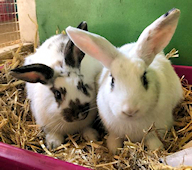 cost £3/child, £1/adult and need to be booked
in advance (call 020 8950 0177). The centre is at Tylers Way, Watford by pass.
cost £3/child, £1/adult and need to be booked
in advance (call 020 8950 0177). The centre is at Tylers Way, Watford by pass.
Currently waiting at NAWT for a home are young brothers, Meadow and River. If you’re interested in homing them, you can meet them at the centre or see nawt.org.uk. But, when thinking about where you would keep them, remember the Rabbit Welfare Association and Fund’s saying that “A hutch is not enough”. You can see creative examples of suitable rabbit housing at rabbitwelfare.co.uk.
Column 30th September 2019
If I ask you what being in the SAS means, you may immediately think of camouflaged
soldiers carrying out undercover operations and dealing with incredibly dangerous
situations. But we’ve got to be careful with abbreviations. To Dogs Trust, SAS means
the Shared Adoption Scheme -
The scheme is a programme of cost-
But a prime candidate to apply to join the SAS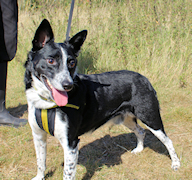 (Dogs Trust style) is Marcus. As a
result of retinal degeneration, Marcus is blind in his left eye and only has a small
amount of vision in his right eye. If I hadn’t known this information in advance,
I wouldn’t have known it from meeting him. Instead of meeting the dog, as I usually
do, in the courtyard, I met Marcus in the long grass where, in true special services
SAS style, he had perfected his undercover operations to such an extent we had difficulty
finding him. He was having a marvellous time sniffing the countryside and exploring
his surroundings.
(Dogs Trust style) is Marcus. As a
result of retinal degeneration, Marcus is blind in his left eye and only has a small
amount of vision in his right eye. If I hadn’t known this information in advance,
I wouldn’t have known it from meeting him. Instead of meeting the dog, as I usually
do, in the courtyard, I met Marcus in the long grass where, in true special services
SAS style, he had perfected his undercover operations to such an extent we had difficulty
finding him. He was having a marvellous time sniffing the countryside and exploring
his surroundings.
Dogs Trust explain how visually impaired dogs can map their usual surroundings –
their home, their regular walking paths -
If you’re interested in homing Marcus, you can meet him at Dogs Trust, Harvil Road, Uxbridge.
While I was at the fabulous Chiswick House Dog Show last Sunday, I caught up with Dog Trust’s Dog School. The good news is that, on a Wednesday evening, Dog School have just started dog classes in Brentford at St Faith’s Church Hall. Booking is essential. For details call 0203 405 9360 or see dogstrustdogschool.org.uk.
September 2019
| Groups 2025 |
| Map |
| Car parking |
| Subject Index |